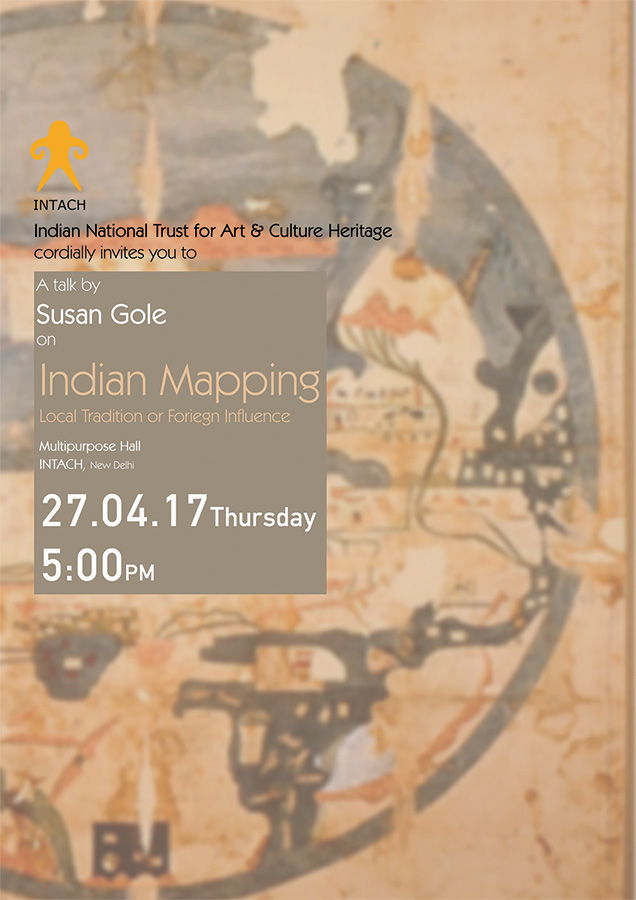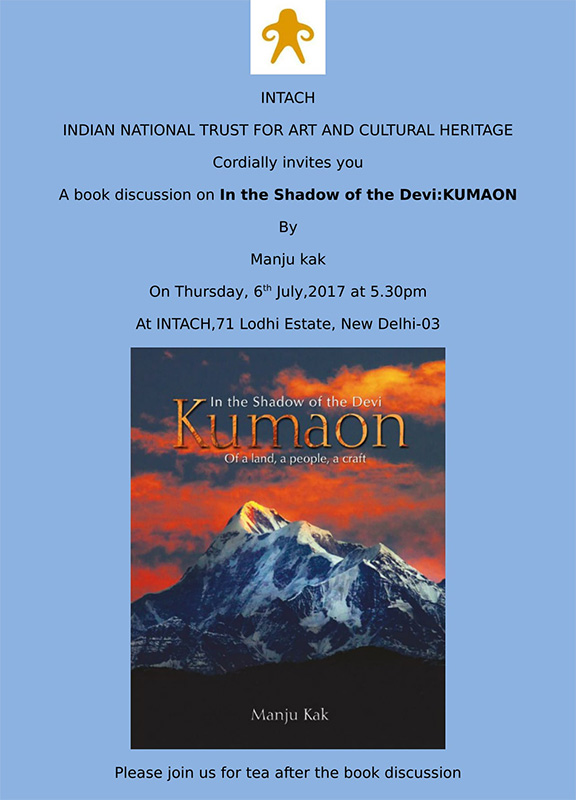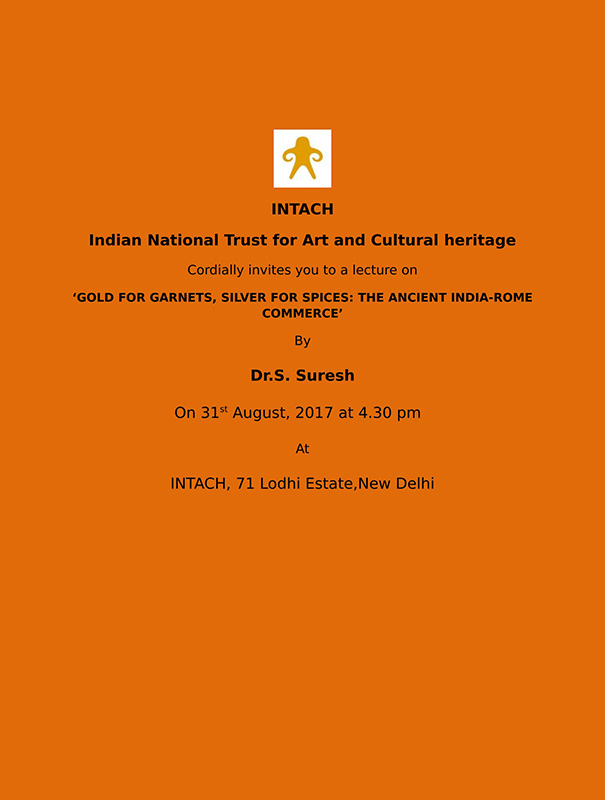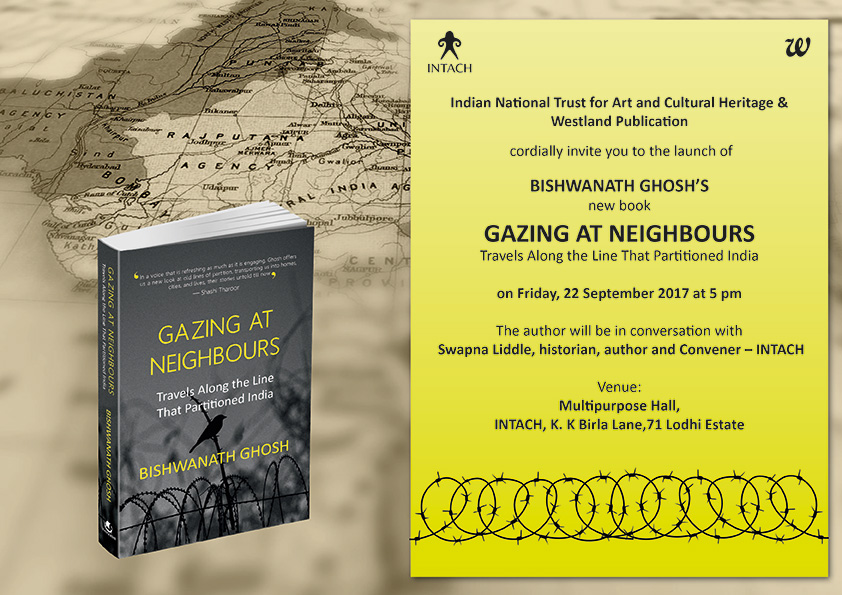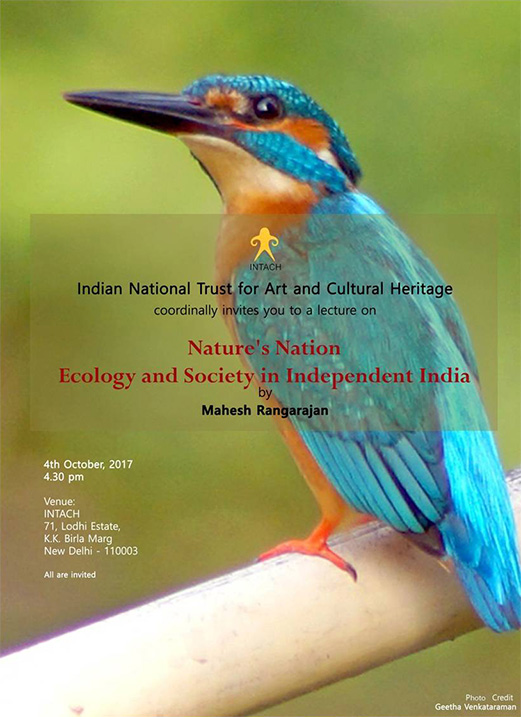Events Archives
-
Lecture on ‘Indian Mapping: Local Tradition or Foreign Influence’ by Susan Gole
Date: 27th April 2017
Time: 5.00pm
Location: Multipurpose Hall, INTACH, New DelhiIt gives us great pleasure to invite you to the lecture on ‘Indian Mapping’ by Susan Gole, which illustrates how, contrary to popular belief, Indians had a prolific mapmaking tradition before any foreign influences arrived to the subcontinent. Aided by the map collection in the City Palace Jaipur she explores the cartographic traditions of India in cloth maps of Kashmir, Surat and Nasik. The lecture is both a study of Indian mapmaking and a call for the preservation of these maps.
Susan Gole spent many years in India. On her return to UK she joined the International Map Collectors Society, became its chairman for nine years, and editor of its journal for sixteen years.
-
Lecture on ‘The Water Story: PAST, PRESENT and FUTURE’ by Manu Bhatnagar
Date: 5th June 2017
Time: 4.30pm
Location: Multipurpose Hall, INTACH, New DelhiIt gives us great pleasure to invite you to the illustrated talk on ‘The Water Story’ by Manu Bhatnagar, which traces the evolution and development of the water scenario in India from ancient times – its place in the cultural, historical, religious, social and political landscapes to the current critical issues with possible solutions, concluding with special reference to the water scenario of NCT Delhi and its recommended water policy.
Manu Bhatnagar is an urban and environmental planner, currently heading the Natural Heritage Division of INTACH – Indian National Trust for Art and Cultural Heritage. As part of natural heritage conservation initiatives he has led several pioneering projects ranging from revival of water bodies, authoring the waterpolicy for Delhi, ecological inventorying of the Yamuna in Delhi, studying high altitude lakes and sacred landscapes. He successfully steered INTACH towards obtaining favorable orders from NGT for revival of Najafgarh Jheel [Gurgaon] and protection of waterbodies in Korna [Barmer]. With innovative techniques of bioremediation he demonstrated the reduction of pollution in the Assi Nadi at Varanasi.
His current projects include the Sambhar Salt Lake in Rajasthan, bio-geographical landscape mapping in the western desert, sustainable agriculture in Central India, conservation plan for the Hindon River.
-
Book Discussion on ‘In the Shadow of the Devi: KUMAON’ by Manju Kak
Date: 6th July 2017
Time: 5.30pm
Location: Multipurpose Hall, INTACH, New DelhiIt gives us great pleasure to invite you to the book discussion on ‘In the Shadow of the Devi’ by the author, who details the legacy of a land, a people and a craft deeply intertwined with its environment. Manju Kak looks at this enigmatic land of Kumaon through the prism of woodcraft, unique in its aesthetic in this part of India, documenting the styles, influences and techniques used by the craftsmen of Uttarakhand, as well as Kumaoni artisans’ worldview and beliefs. In addition, this book is an important document of the life of paharis, as it also discusses communities, forest policy and the status of women, analyzing and unraveling facets of hill life that made the claim for statehood so unique.
Manju Kak is a writer, critic, scholar and artist who for two decades through word, image, research or curatorial theme, has been intensely exploring some unique aspect of Himalayan life. It led her to make the documentary, They Who Walked Mountains (2002). She edited the book Nicholas Roerich: A Quest & Legacy (2011) and curated an ethnographic exhibition titled Kashmiri Pandits, A Vintage Album: The Making of Modern India (2013).
The author will be in discussion with Professor AG Krishna Menon – an Architect, Urban Planner and Conservation Consultant and Susan Visvanathan – Professor of Sociology at Centre for the Study of Social Systems.
-
Lecture on ‘Gold for Garnets, Silver for Spices: The Ancient India-Rome Commerce’ by Dr. S. Suresh
Date: 31st August 2017
Time: 4.30pm
Location: Multipurpose Hall, INTACH, New DelhiIt gives us great pleasure to invite you to the lecture on ‘The Ancient India-Rome Commerce’ by Dr. Suresh, which will cover the ancient kingdoms of South India traded with the Roman Republic and later, with the Roman Empire and its successive empires in the Mediterranean Region. These contacts started around 300 B.C.E. and continued right up to around the fourth century C.E. and to a limited extent, even during the later times.
Besides archaeology, the evidences for these contacts include the limited references to the trade in ancient Greek, Latin, Tamil and Sanskrit literature. Based on extensive field research in South Asia and Europe, the lecture unfolds the little-known story of the Rome-India contacts. The presentation takes you on a unique voyage across the places through which the Romans travelled in India and the interesting things – coins, ceramics, sculptures – that they left behind at those sites.
Dr. Suresh was a Fulbright Senior Research Fellow (2011) and again (2015-16), a Fulbright Visiting Professor, researching and lecturing at Harvard, University of California-Berkeley and the National Trust for Historic Preservation—INTACH’s counterpart in the U.S.A.He has a doctorate in Classical Archaeology and another in Medieval South Asian Art . Currently, he is the Tamil Nadu State Convener for INTACH and a consultant in archaeological tourism, museum management and art education. He has authored 70 research papers and 36 books including college textbooks, exhibition catalogues and historical novels. Dr. Suresh has the distinction of being the first Indian to be invited by the Archaeological Institute of America, Boston as the Samuel Kress National Lecturer for the year 2017-18.
-
Book launch of Bishwanath Ghosh’s – ‘Gazing at Neighbours’
Date: 22nd September 2017
Time: 5.00pm
Location: Multipurpose Hall, INTACH, New DelhiIt gives us great pleasure to invite you to the book launch of Bishwanath Ghosh ‘Gazing at Neighbours’. On July 1947, British barrister Cyril Radcliffe was summoned to New Delhi and given five weeks to draw, on the map of the subcontinent, two zigzagged lines that would decide the future of one-fifth of the human race.
One line, 553 kilometres long, created the province of West Punjab; the other, adding up to 4,096 kilometres, carved out a province called East Bengal. Both territories joined the new-born nation of Pakistan-an event called the Partition of India, which saw one million people being butchered and another fifteen million uprooted from their homes.
Curiosity leads Bishwanath Ghosh into journeying along the Radcliffe Line-through the vibrant greenery of Punjab as well as the more melancholic landscape of the states surrounding Bangladesh-and examining, first hand, life on the border. Recording his encounters and experiences in luminous prose, Gazing at Neighbours is a narrative of historical stock-taking as much as of travel.
Bishwanath Ghosh, is the author of the hugely popular Chai, Chai: Travels in Places Where You Stop but Never Get Off, which was his first book, Tamarind City: Where Modern India Began, and Longing, Belonging: An Outsider at Home in Calcutta. He currently lives in Chennai, where he works as an Associate Editor with The Hindu.
-
Lecture on ‘Nature’s Nation – Ecology and Society in Independent India’ by Professor Mahesh Rangarajan
Date: 4th October 2017
Time: 4.30pm
Location: Multipurpose Hall, INTACH, New DelhiIt gives us great pleasure to invite you to the lecture on ‘Nature and Nation’ by Professor Mahesh Rangarajan. Both are intimately connected in ways we are aware of but rarely reflect upon. India is not only home to over a billion humans but also to 25000 varieties of flowering plants. Over a thousand bird species and half as many mammals which fly, run, burrow or walk over on these lands and waters.
Deep as cultural and social linkages with nature are – the surge in human numbers and the expansion of the economic base have led to large, often negative ecological changes. Making space for nature has been a challenge since independence.
In many ways the frame of protection evolved and grew in the years 1969 to 1989. Though often centralized and overly bureaucratic it did have significant accomplishments. The last quarter century or so has generated both larger challenges and greater hopes.
Mahesh Rangarajan teaches History and Environmental Studies at Ashoka University. He studied at Hindu College, University of Delhi. He was a Rhodes Scholar at Balliol and Nuffield College Oxford.
His most recent work was Nature and Nation (2015). A couple of edited works Nature and History is forthcoming with OUP. Other works include India’s wildlife history (2001) and the co edited works – Shifting Ground (2014) and Nature Without Borders the same year.



